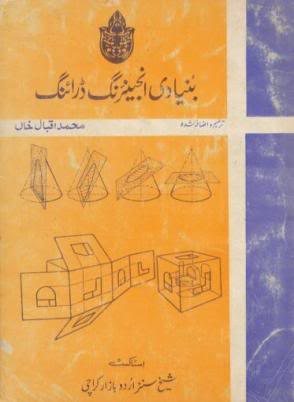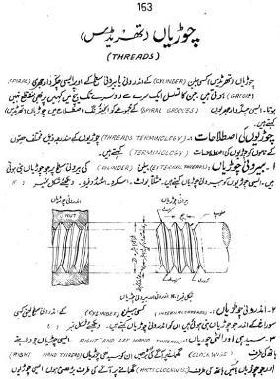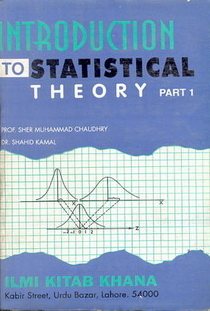 In this post we will talk about two topics. One is the dearth of technical books in Urdu and second is the dearth of text books in any language by Pakistani authors at undergraduate and graduate level.
In this post we will talk about two topics. One is the dearth of technical books in Urdu and second is the dearth of text books in any language by Pakistani authors at undergraduate and graduate level.
I have a habit. Every few days I like to sit in front of my book shelf and look at my collection. Last time I did that, my wandering eyes got stuck at one book which I had not noticed in while. It was my very own and very dear book of ‘bunyaadi (Basic) Engineering Drawing’ by M Iqbal Khan.
 It was first published in 1978 and it used to be one of our text books in First-Year of Engineering(1990). Most of you may know that students in Pakistani Engineering colleges go through 40+ courses in their 4-year degree program but what may surprise you is that none of the text books for these courses are written by Pakistani authros — except for two that I know of. One of them is the bunyaadi (Basic) Engineering Drawing. This was also the only text book written in Urdu which was taught at undergrad level.
It was first published in 1978 and it used to be one of our text books in First-Year of Engineering(1990). Most of you may know that students in Pakistani Engineering colleges go through 40+ courses in their 4-year degree program but what may surprise you is that none of the text books for these courses are written by Pakistani authros — except for two that I know of. One of them is the bunyaadi (Basic) Engineering Drawing. This was also the only text book written in Urdu which was taught at undergrad level.
That was 20 years ago. Things must’ve changed by now. Hopefully for better. We all know that AutoCad and Solid Works have completely replaced the skills of technical drawing by hand and geometrical tools. No wonder the best cheap drawing tablet is also on the rise to make these digital illustrations possible.
The set of tools called ‘French curves’ may now appear as a reference to human anatomy to many. See a photo of French Curves here.
 As I am writing this post, the book of M. Iqbal Khan is next to me and I am going to pick some ‘cheeda cheeda’ (selected) highlights from it. Iqbal Khan was an instructor at Jamia Millia Polytechnic Institute of Malir, Karachi and later taught at Balochistan Engineering College in Khuzdar. In the first 10 years of its publication (1978-88), this book sold 33550 copies.
As I am writing this post, the book of M. Iqbal Khan is next to me and I am going to pick some ‘cheeda cheeda’ (selected) highlights from it. Iqbal Khan was an instructor at Jamia Millia Polytechnic Institute of Malir, Karachi and later taught at Balochistan Engineering College in Khuzdar. In the first 10 years of its publication (1978-88), this book sold 33550 copies.
The very first lesson is about ‘lettering’ and step by step the book proceeds to teach concepts of drawings conic sections, orthogonal projections, mechanical sectioning, threads (called chooriaN – literally meaning bangles in Urdu) etc.
Look at the image to the right above. It teaches how to draw mechanical threads.
I don’t want to bore our versatile readership with technical terms but this book was indeed the one which impressed myself and my colleagues a lot and we learnt our technical drawing concepts from it.
 Besides the above mentioned book there is one more text book of graduate level book by a Pakistani author that I know of. It is called the ‘Introduction to Statistical Theory’ and is written by Professor Sher Mohammad Chaudhary.This book was a text book for Statistics for us in Bachelors. I know this book is also a prescribed text book Masters level programs.
Besides the above mentioned book there is one more text book of graduate level book by a Pakistani author that I know of. It is called the ‘Introduction to Statistical Theory’ and is written by Professor Sher Mohammad Chaudhary.This book was a text book for Statistics for us in Bachelors. I know this book is also a prescribed text book Masters level programs.
Ok. so while I started this post with a narrow narrative about Iqbal Khan’s book, I now want to broaden up the scope. How about you let us know if you are privy to seeing or studying any other text book by a Pakistani author whether in English or Urdu at degree level. Let us know of the books and we will list them here.
I am aware that there are several technical books by Pakistani authors – but most of them are for reference studies. We are looking for names of text books.
So far the list is 16 books long. anymore names? sahibaan aur qadardaan?
List of Degree Level Text Books by Pakistani Authors:
1. bunyaadi Engineering Drawing by Mohammad Iqbal Khan
2. Introduction to Statistical Theory Part I and II by Professor Sher Mohammad Chaudhary, Published by Ilmi Kitab Khana
3. Mathematical Methods by S.M.Yousuf, Published by Ilmi Kitab Khana, 1999.
4. Calculus and Analytical Geometry by S.M.Yousuf
5. Comprehensive Book of Mechanics by Q.K. Ghori published by A.H. Publishers, Lahore
6. Analog and Digital Circuit Design by Shahzad Mahmood. First edition 2003.
7. Amplifiers and Receiver Circuits prescribed by NISTE (National Institute of Science and Technical Education, Islamabad. Published by National Book Foundation, Pakistan. 2002
8. Basic Engineering Drawing and CAD prescribed by NISTE (National Institute of Science and Technical Education, Islamabad. Published by National Book Foundation, Pakistan. 2002
9. Basics of Engnieering Drawing by Zahid Ahmed, Muhammad Ashraf and Shahid Ahmed. Published by Prince Book Depot, 2005.
10. Electronic Media published by National Book Foundation, Pakistan. 1998
11. Irrigation and Drainage Engineering by Iqtidar Siddiqui. published by Oxford 2007. ISBN 9780195473568.
12. Surface Water Hydrology by N.M.Awan, 2003
13. Surveying and Leveling – for architecture Technology – with Lab instruction manual. Prescribed by NISTE (National Institute of Science and Technical Education, Islamabad. Published by National Book Foundation, Pakistan. 2001
14. Theory of Automation and Computation by Sikandar Hayat Khiyal. Published by National Book Foundation, Pakistan. 2004
15. Voice of Civil Engineering by Abdul Hasan and Sarah Haider, 2003
16. Electronic Circuits and Devices by Dr. Manzar Saeed.
17. Fault Diagnosis and Testing of Digital Circuits with an introduction to Error Control Coding by Dr. Altaf Mukati. Published by HEC
References:
1. Federal Urdu University of Arts, Science and Technology, Karachi and Islamabad.
2. National Institute of Science and Technical Education (NISTE), Ministry of Education, Government of Pakistan.
3. Oxford University Press, Pakistan – Books Catalog for Higher Education
4. National Book Foundation, Pakistan



















































Owais, I must say the topic you have chosen is very important and needs to be discussed at the national level. But before I start mentioning a few text books (in Urdu/English) by Pakistani authors, I would like to suggest you change the title to ‘Text Books by Pakistani Authors: Where are they not there?’ and then I’m sure you will get not only answers to your question but an enhanced interest in the topic as well.
I’m not being critical here for no reason and I hope you would not be offended if say mildly the topic you have chosen only reflects our national mindset whereby we take pride in speaking or trying to speak English at the expense of our National and regional languages. When you and I and thousands of our compatriots write/speak in English, between ourselves, it shows that we as a nation are not yet ready to make progress (I’m not at all against speaking English or any other European language).
I haven’t got much time and space to develop my arguments in detail at this stage, but the ‘language factor’ is the single most important factor’ that is seriously preventing us from making a real change in our nation. How would you explain that since 1947 we have only managed to write a few dozen quality text books in Urdu and/or English? That today while living in a very modern and sophisticated era we are being asked about the number of text books written by Pakistani authors? The answer to the question, that you posed and the the one that I have amended, lies in the use of the language that we are taught in during our primary and secondary education!
Pakistan is a true multicultural country where languages spoken are completely different from each other – except Urdu and Punjabi which are quite similar to each other. Now if a pupil who at a primary school level in the rural areas, only speaks his mother tongue, will find it a bit difficult to comprehend various educational concepts and ideas in Urdu; he/she will continue with his/her education and once in high school (please keep in mind we are still talking about the rural and far flung areas where the main language is not Urdu and rural areas make the largest part of the Pakistani population) the subjects start getting more and more complex and difficult but the medium/tool of instruction, that is the language lags behind, in particular with the introduction of another foreign language ‘The English’, teaching/receiving education or the whole purpose of learning becomes directionless. Teachers are not trained enough to teach the normal subjects in the local or national language not to mention teaching them in a foreign language over which they have no command! How many of us at home speak English. How many of our common folks understand the meaningless Egnlish phrases that our so-called politicians, and shamefully, even are pseudo-intellectuals use whilst discussing/debating crucial national issues on the national TV and radios (these days we have got a plethora of channels any way). But the fact is we do not speak correctly (I’m not talking about a tiny minority); our teachers at schools struggle, our professors at the uinversities struggle; their students don’t follow the lecture; the degree level students because of their shortcomings in their langguage skills can reproduce the ideas/concepts in their own word that they have learnt – what they do is to learn them by heart – go and attend some scientific seminars/conferences and you will witness the difficulty Pakistani scientist inside of Pakistan face when it comes to handling complex questions/concepts.
Look at what we do in our important social events where the audience is addressed in English; the posters displayed are in English, the welcoming/introductory banner displayed behind the chief guest and his cohorts is in English; the beautiful presentation is presented in English!!! But how many from amongst the audience understands fully what is being said and those who understand because of their incompetence in English hesitate to get involved in the debate. No wonder in most of such social events you only listen! We don’t lack the skill to speak, we lack the language to speak.
Look at our judicial system: our judges and advocates use English language. How many of their clients understand what is being said on their behalf. The judicial record is maintained in English – for God’s sake Lord Mountbatten is dead now! Give us some break.
Pakistanis living here in the west can’t speak proper Urdu; they ask for Mirpuri, Punjabi, Pashto, Hindko, Balochi, Brahui and Sindhi interpreters to help them cope with their day to day administrative and legal matters – at school their newly arrived young children get assistance from bi-lingual tutors, and, we are pretending in Pakistan that English is our mother tongue!!! What a paradoxical hypocrisy!
Even our presidents and prime ministers speak with our mostly illiterate nation in English. I am sure millions of Pakistanis, like my mother and grand parents, don’t understand a single word of what our neo-slavish leaders say to the nation.
I think I have to cut it short now! For all the above reasons and many more that I have not discussed, not to mention the language we use for our official and clerical correspondence, I would say since we have been stripped off our tool/medium of instruction/learning, we have therefore lost confidence in ourselves: our education is incomplete; we live in a constant state of denial.
Owais Mughal Sahib answering to your question, I would say I don’t know how many more Pakistani authors of text books will you find, but rest assured the number is not going to increase – because of the language issue. Before, we were copying and translating in Urdu, now because of access to global souces of information we will be cutting and pasting!
We can produce genuine scientist, writers and academicians if we adopt a genuine policy towards addressing flaws in our education system! But the importance of the mother tongue or at least that of the national language should not be underestimated.
To those who are going to jump to conclusion regarding my usage of English and label me as a hypocrite, I would say yes I’m a hypocrite, I am really ashamed for writing in English; when I am sitting with Pakistanis I hardly use English phrases in my conversation. I hope one day when internet programmes will be made more Urdu-friendly, then people like me will write more and more in Urdu! If I had written my comments in Urdu, you would not have read it.
Interesting Discovery! never knew Pakistan Author also made so much in writing field
Very good topic indeed. But I would like to take it one step further and ask the question about where are the readers for these books going to come in the next generation? Most of us who have read these books have kids of our own, but how many of us are actually encouraging our children to read Urdu books. I remember growing up in Karachi in the 80’s we were hooked on Urdu detective novels and couldn’t wait to get our hands on the latest ones. In just one generation it has somehow become a social taboo to read Urdu story books. Most of the blame lies with our generation of young parents who find it perfectly appropriate to buy expensive gaming systems but are not willing to spend a fraction of it on good Urdu books which can teach our children a lot.
We need to embrace technology to teach Urdu to our young children and one website which does a great job in interactively teaching Urdu is http://www.urduathome.com
Tashakkur.
Thanks for the post. Interestingly, the cover looks similar to Urdu books published in India. There was a drought of such books in Urdu in India, but lately a few good books came to my notice.
Sridhar
B.L Theraja was also famous for adding 100s of pages to his book every year. In my first year his book was 1400 pages thick and in next 4 years it swelled up to 2500 pages. I don’t how thick it is now. It may have gone down a bit b/c I used to hear Urdu bazaar book sellers complaining about 2500 pages held in one binding – was not very feasible :)